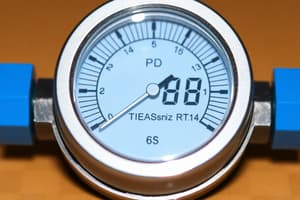Podcast
Questions and Answers
What is the default setting for the PPM display option in the factory adjustable features?
What is the default setting for the PPM display option in the factory adjustable features?
- 1 ppm
- 5 ppm
- 10 ppm (correct)
- 15 ppm
What is the factory setting for the alarm - LEL percentage?
What is the factory setting for the alarm - LEL percentage?
- 25%
- 75%
- 40%
- 50% (correct)
What is the primary purpose of performing a bump test?
What is the primary purpose of performing a bump test?
- To adjust the user settings
- To replace the battery
- To print calibration logs
- To verify sensor accuracy (correct)
Which of the following is essential before using the device in a new environment?
Which of the following is essential before using the device in a new environment?
What should be done after replacing the device's battery?
What should be done after replacing the device's battery?
During operation, which of the following should be checked regularly for accuracy?
During operation, which of the following should be checked regularly for accuracy?
What should be ensured before starting the SENSIT® HXG-3 to obtain a proper zero?
What should be ensured before starting the SENSIT® HXG-3 to obtain a proper zero?
What is the resolution of LEL readings displayed by Model 3.30?
What is the resolution of LEL readings displayed by Model 3.30?
Which LED indicator flashes when the alarm condition exists due to levels between 10.0 - 24.9% LEL?
Which LED indicator flashes when the alarm condition exists due to levels between 10.0 - 24.9% LEL?
How can the audible alarm be disabled during an alarm condition?
How can the audible alarm be disabled during an alarm condition?
What happens to the display and LED indicators when a gas is sensed?
What happens to the display and LED indicators when a gas is sensed?
What is the maximum percentage LEL concentration indicated by the red (HAZ 3) LED during an alarm?
What is the maximum percentage LEL concentration indicated by the red (HAZ 3) LED during an alarm?
What occurs when the thumbwheel is rotated and a steady ticking sound is heard?
What occurs when the thumbwheel is rotated and a steady ticking sound is heard?
What should you do to access the user menu from the working display?
What should you do to access the user menu from the working display?
How can you reset the timer to ensure the unit remains always on?
How can you reset the timer to ensure the unit remains always on?
What does pressing the MENU button do when in the SET CLOCK function?
What does pressing the MENU button do when in the SET CLOCK function?
What indicates that downloading is in progress?
What indicates that downloading is in progress?
What is the primary function of the ticker sound generated by the SENSIT® HXG-3 instrument?
What is the primary function of the ticker sound generated by the SENSIT® HXG-3 instrument?
Which type of battery is required for the operation of the SENSIT® HXG-3 instrument?
Which type of battery is required for the operation of the SENSIT® HXG-3 instrument?
During an alarm condition, what does the red Hazard 3 LED indicate?
During an alarm condition, what does the red Hazard 3 LED indicate?
What feature allows the operator to manually adjust the instrument's settings and exit menus?
What feature allows the operator to manually adjust the instrument's settings and exit menus?
What type of gas sensor is incorporated in the SENSIT® HXG-3 instruments?
What type of gas sensor is incorporated in the SENSIT® HXG-3 instruments?
What feature on the SENSIT® HXG-3 allows visual indication of gas concentrations?
What feature on the SENSIT® HXG-3 allows visual indication of gas concentrations?
What should an operator do if the tick sound disappears while searching for a gas leak?
What should an operator do if the tick sound disappears while searching for a gas leak?
What action will save all readings on the display for later download?
What action will save all readings on the display for later download?
How can an operator turn off the SENSIT® HXG-3 device?
How can an operator turn off the SENSIT® HXG-3 device?
What should be done if a calibration past due message appears during warm-up?
What should be done if a calibration past due message appears during warm-up?
What does the display show when calibration is successful?
What does the display show when calibration is successful?
How long should the instrument operate in a gas-free environment prior to calibration?
How long should the instrument operate in a gas-free environment prior to calibration?
When preparing for calibration, which calibration gas should be used for an instrument set to methane?
When preparing for calibration, which calibration gas should be used for an instrument set to methane?
Which button is used to access the user menu from the working display?
Which button is used to access the user menu from the working display?
What is the required action after completing a bump test?
What is the required action after completing a bump test?
Which gas types can be selected as primary sensors using their respective buttons?
Which gas types can be selected as primary sensors using their respective buttons?
Flashcards are hidden until you start studying
Study Notes
Operating Instructions for SENSIT® HXG-3
- ERROR LEL indicates a sensor is inoperable or improperly zeroed at startup.
- Model 3.30 shows LEL% only, while Model 3.35 displays both LEL% and ppm readings.
- All LEL readings come with a resolution of 0.1% LEL or 50 ppm for methane; ppm readings are displayed simultaneously.
- Manual zeroing of the instrument may be necessary depending on company practices and environmental conditions.
- Always start the SENSIT® HXG-3 in a gas-free environment to ensure proper zeroing.
- An optional extension adapter can help test high areas or overhead lines, using a broom handle or painter's stick.
Alarm Indicators
- Display updates when gas is sensed, and LEDs will illuminate at preset concentration levels.
- LED warnings:
- Amber LED (Low): 5 - 9.9% LEL methane
- Red LED (Haz1): 10.0 - 24.9% LEL
- Red LED (Haz2): 25.0 - 49.9% LEL
- Red LED (Haz3): 50.0 - 100% LEL
- During alarm conditions (default at 50% LEL), the display flashes and a red (HAZ 3) LED along with an audible alarm activates.
- Suppress the audible alarm using the POWER/MUTE button; toggle it again to re-enable.
Leak Detection
- For detecting small combustible gas leaks, adjust the thumbwheel until a steady ticking sound is heard.
- The detection method has no warm-up time since it utilizes the active LEL sensor.
- When closer to a leak, the ticking sound increases; a steady tone indicates proximity to the gas source.
Factory Adjustable Features
- Session Saves: range from 1-100, default is 6.
- Alarm - LEL range is adjustable from 0-100%, with a default setting of 50%.
- PPM Display options available as 1 ppm or 10 ppm; default is 10 ppm.
- Calibration Due intervals can be set between 30 to 360 days; default interval is 30 days.
- Warm-up time adjustable from 10 to 30 seconds; default is 30 seconds.
Warranty Information
- Warranty covers defects in materials and workmanship for two years post-purchase (excluding calibration and batteries).
- Warranty does not cover damage from shipment, misuse, or improper maintenance.
- Proof of purchase may be required for warranty claims; units out of warranty will incur service charges.
- Repairs must be conducted by authorized technicians; any violation will void the warranty.
Product Overview
- Approved for UL913 use in Class 1, Division I, Groups C & D hazardous locations with alkaline batteries.
- Constructed of durable ABS plastic for field durability.
Key Features
- Requires 3 "C" type alkaline batteries; Duracell MN 1400 batteries provide ~25 hours of use.
- Equipped with a thumbwheel for audible tick activation, aiding in gas leak detection.
- Flexible gooseneck allows for locating gas leaks and remote sampling.
- Two-line display shows gas concentrations, alarms, and battery power.
- LED indicators preset for combustible gas concentrations with a Hazard 3 LED for alarm conditions.
Operational Buttons
- Button (A): Power/Mute to operate power and mute functions, exit menus.
- Button (B): Menu to enter and adjust menu items.
- Button (C): Save/Zero to save data, zero sensors, navigate menu items.
Sensor Functionality
- Combustible Gas Sensor utilizes sensitive semiconductor technology monitored by specialized circuitry.
- Detects gas leak presence more effectively than liquid detection fluids.
Operation Guidelines
- Readings can be saved by pressing the Save/Zero button; memory is adjustable from 1 to 100 events.
- Change gas sampling locations per safety regulations, with alarms activated at preset limits.
- Automatic display backlight for dark conditions.
- Power off by pressing and holding Power/Mute button for 5-6 seconds.
Calibration Check
- Calibration requires exposure to known test gases; failure to meet specifications indicates calibration or replacement necessity.
- Calibration past due alerts displayed during startup; check when malfunctions are suspected.
User Menu Features
- Print Menu for session and calibration logs, Smart-Cal access, and calibration setup.
- Power Off settings manage automatic shutoff timers.
- Set Clock option to adjust date and time.
- Bump Test to check responsiveness; failure indicates possible repair needs.
Smart-Cal Calibration Process
- Access Smart-Cal Calibration from working display; connect to calibration station.
- Instrument indicates pass/fail at completion; retry if necessary.
- Shortcut for Smart-Cal access by directly attaching to calibration cradle.
Gas Type Selection
- Allows choosing between Pentane and Natural/Methane as the primary gas to be detected.
Calibration Procedures
- Calibration aligns sensor readings with certified gas values; incorrect kits may lead to inaccuracies.
- For combustible gas calibration, use 50% LEL Methane or Pentane depending on prior gas type selection.
- Conduct initial zeroing in gas-free environment before calibration gas application.
- Successful calibration is confirmed with a data saved notification; repeat failures require service contact.
Studying That Suits You
Use AI to generate personalized quizzes and flashcards to suit your learning preferences.




